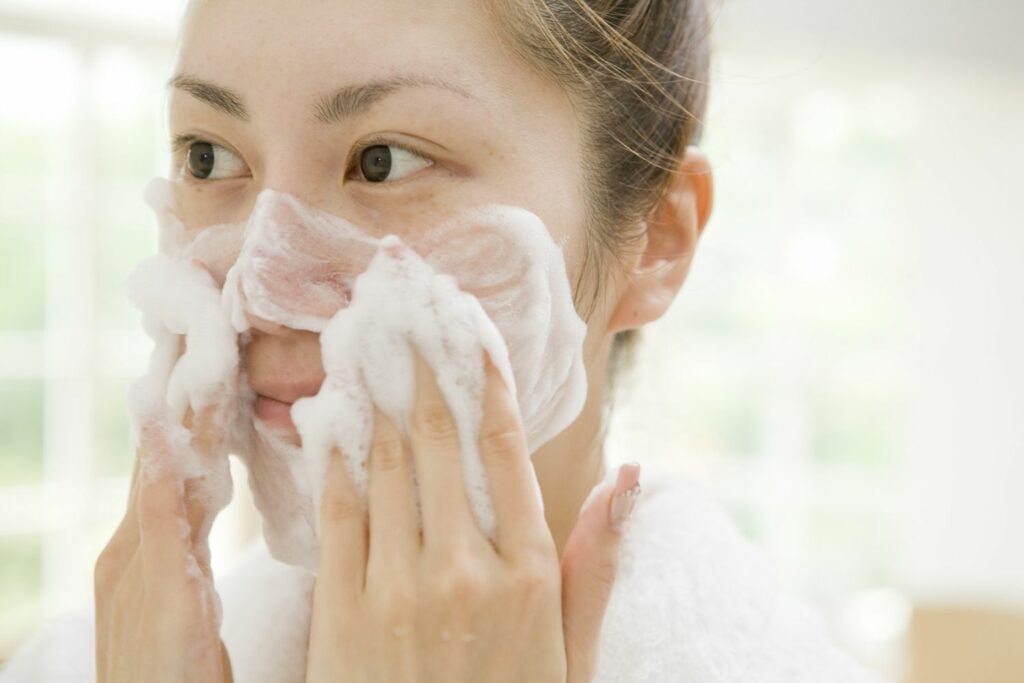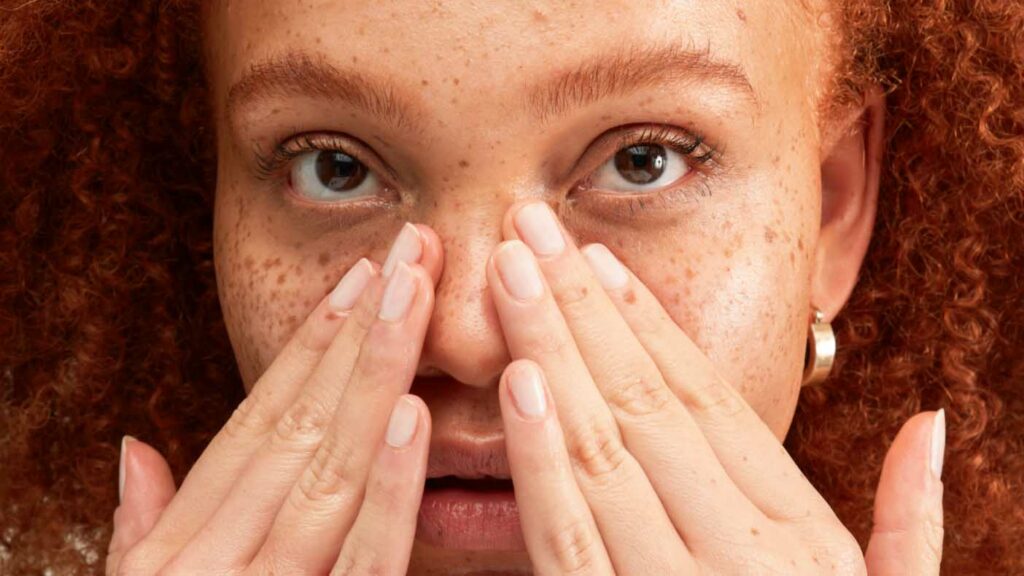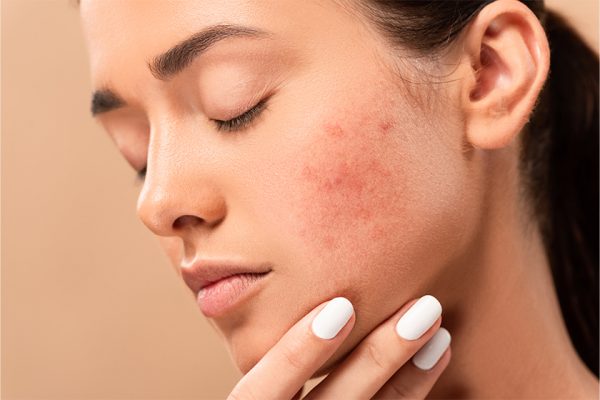Acne-prone skin can be a frustrating and challenging condition to manage. It is essential to understand the characteristics and causes of acne before establishing an effective skincare routine. Acne occurs when hair follicles become clogged with oil, dead skin cells, and bacteria, leading to inflammation and the formation of pimples, blackheads, or whiteheads. Factors such as hormonal changes, genetics, and environmental factors can contribute to acne. Developing a skincare routine specifically tailored for acne-prone skin can help prevent breakouts, reduce inflammation, and promote clearer skin.
Here, we will explore the best skincare routine for acne-prone skin, including suitable cleansers, exfoliators, treatments, and moisturizers to achieve a healthier and clearer complexion.
Morning Skincare Routine for Acne-Prone Skin (5-Steps)

If you’re battling acne-prone skin, a customized morning skincare routine can be a game-changer. An effective routine consists of cleansing, toning, treating, moisturizing, and protecting your skin from the sun. Each step plays a crucial role in managing acne and enhancing the overall health of your skin.
1. Cleansing
Kickstarting your day with the right cleanser sets the tone for your skincare regimen. For acne-prone skin, opt for a gentle, non-comedogenic cleanser that removes excess oil and impurities without stripping your skin of its natural oils. Ingredients like salicylic acid, benzoyl peroxide, or tea tree oil can effectively combat acne by unclogging pores and reducing inflammation.
2. Toning
Toners restore your skin’s pH balance after cleansing, and they also help in removing any residual dirt or makeup. Look for toners that are alcohol-free to prevent over-drying. Ingredients like witch hazel, niacinamide, or green tea can help control oil production, minimize pores, and soothe irritation, making them beneficial for acne-prone skin.
3. Treatment
Following toning, apply a spot treatment or serum targeting specific acne concerns. Serums with active ingredients like retinol, vitamin C, or hyaluronic acid can help reduce acne inflammation, brighten skin, and retain moisture. Remember, less is more when applying these potent products.
4. Moisturizing
Contrary to popular belief, acne-prone skin needs moisturizing too. Skipping this step can cause your skin to produce more oil to compensate for the lack of hydration. A lightweight, oil-free moisturizer can hydrate your skin without clogging pores. Look for non-comedogenic products with calming ingredients like aloe vera or centella asiatica.
5. Sun Protection
Sun protection is a must, regardless of your skin type. Sun exposure can exacerbate acne and lead to hyperpigmentation, making acne scars more noticeable. Opt for a broad-spectrum sunscreen with SPF 30 or higher. For acne-prone skin, mineral sunscreens, also known as physical sunscreens, can be a good choice as they are less likely to cause skin irritation or pore-clogging.
A thoughtfully curated skincare routine can make a significant difference in managing acne-prone skin. However, remember that consistency is key. Seeing a noticeable difference takes time, so be patient and persistent. Lastly, listen to your skin and tweak your routine if needed. What works for others may not work for you, so it’s essential to pay attention to how your skin responds to different products and adjust accordingly.
Evening Skincare Routine for Acne-Prone Skin (4-Steps)

Just as the morning routine prepares your skin for the day ahead, the evening regimen is essential to rejuvenate your skin overnight. If you have acne-prone skin, a specially tailored night routine can make all the difference. Here’s how to craft the perfect evening routine for acne-prone skin involving double cleansing, exfoliation, acne treatments, and hydration.
1. Makeup Removal
If you wear makeup, the first step should be to remove it thoroughly. However, even if you don’t, double cleansing is highly beneficial. The first cleanse removes surface impurities like makeup, sunscreen, and pollutants. The second cleanse targets the pores to remove excess sebum and dead skin cells. Oil-based cleansers work great for the first cleanse, melting away makeup and grime. Follow this up with a gentle, acne-fighting cleanser. This method ensures a deep clean without over-stripping the skin.
2. Exfoliation
Exfoliation helps remove the buildup of dead skin cells, a leading cause of acne. However, it’s essential not to over-exfoliate as it can strip the skin of its natural oils and lead to irritation. For acne-prone skin, a gentle chemical exfoliant like salicylic acid, glycolic acid, or lactic acid can be beneficial. Aim to exfoliate 2-3 times a week, gradually increasing as your skin gets used to it.
3. Acne-fighting Night Treatments and Serums
Nighttime is perfect for treatment-focused products as the skin’s regenerative process is most active during sleep. Depending on your skin concerns, you can use targeted treatments such as retinol serums, spot treatments, or acne patches. Retinol is highly effective for acne-prone skin, reducing inflammation and promoting cell turnover. Remember to introduce these products gradually to prevent skin from becoming irritated.
4. Night Creams or Moisturizers
Moisturizing is an essential step, even for acne-prone skin. At night, choose a product that not only replenishes lost moisture but also aids in the skin’s natural repair process. Look for non-comedogenic night creams or gels packed with skin-nourishing ingredients. Hyaluronic acid, ceramides, and niacinamide can help retain moisture, strengthen the skin barrier, and regulate oil production.
A consistent and well-planned evening routine can help manage and improve acne-prone skin. Just remember that results don’t come overnight. Skincare is a journey that requires consistency, patience, and a dash of self-love. Moreover, everyone’s skin is unique, so be flexible with your routine.
Weekly Skincare Additions in Acne-prone skin
Managing acne-prone skin requires more than daily care. Adding special treatments to your skincare routine once or twice a week can boost your results. Here are the key weekly additions for acne-prone skin:
. Face Masks: Clay or charcoal masks can absorb excess oil and remove impurities from your pores, reducing acne. Look for masks containing salicylic acid or benzoyl peroxide for an extra acne-fighting boost.
. Exfoliating Scrubs or Peels: A weekly exfoliating scrub or chemical peel can help remove dead skin cells that might clog pores. Choose a product with salicylic acid, glycolic acid, or lactic acid for maximum effectiveness.
. Hydrating Masks: Hydration is crucial even for oily, acne-prone skin. Using a hydrating mask once a week can help balance your skin and prevent overproduction of oil.
. Spot Treatments: When breakouts occur, using a spot treatment can help reduce inflammation and speed up healing. Apply it directly to pimples and let it work its magic.
. Skin Detox: Giving your skin a break from makeup or heavy products once a week can allow it to breathe and restore its natural balance, reducing acne.
Remember, while these additions can greatly benefit your skin, it’s also important not to overload your skin with too many products. Always listen to your skin and adjust your routine as necessary.
Common Mistakes to Avoid with Acne-Prone Skin
Ignoring acne-prone skin can be tricky. While trying to manage breakouts, it’s easy to make mistakes that may worsen the condition. Here are some common mistakes to avoid:
. Over-Cleansing: Washing your face more than twice a day can strip the skin of its natural oils, leading your skin to produce more oil and potentially exacerbate acne.
. Skipping Moisturizer: People often skip this vital step, thinking it can cause more breakouts. However, even acne-prone skin needs hydration. Skipping moisturizer can lead your skin to overcompensate by producing more oil.
. Over-Exfoliation: While exfoliation can help prevent acne, overdoing it can lead to skin irritation and increase inflammation. Stick to exfoliating 2-3 times a week.
. Not Changing Pillowcases Regularly: Dirt and oil can accumulate on pillowcases, which can clog pores if not changed regularly.
. Ignoring Diet: Certain foods may trigger acne in some people. Paying attention to your diet and identifying potential triggers can help manage acne.
. Picking or Squeezing Pimples: This can lead to scarring, infection, and more inflammation. Allow pimples to heal naturally or seek professional treatment.
. Skipping Sunscreen: Sun exposure can worsen acne and acne scars. Always apply sunscreen, even on cloudy days.
. Using the Wrong Products: Always choose non-comedogenic skincare and makeup products that won’t clog pores.
. Neglecting a Consistent Skincare Routine: Consistency is key in managing acne-prone skin. Stick to your routine and give products enough time to show results.
. Not Seeking Professional Help When Needed: If your acne is severe or not responding to over-the-counter treatments, it’s important to seek help from a dermatologist. They can provide treatments and advice tailored to your specific skin condition.
Conclusion
Handling acne-prone skin can be a delicate balancing act. It requires understanding your skin’s unique needs and tailoring your routine to meet them. From daily cleansing, toning, and moisturizing to weekly masks and exfoliating treatments, each step plays a crucial role. Consistency is key in witnessing tangible results. However, remember that skincare is not one-size-fits-all. What works wonders for one might not have the same impact on another.
Hence, be patient, listen to your skin, and don’t be afraid to adjust your routine. If your acne persists or worsens, seeking professional advice from a dermatologist is a good idea. Remember, achieving healthy skin is a journey, not a destination. Be patient, and give your skin the gentle care it deserves.


